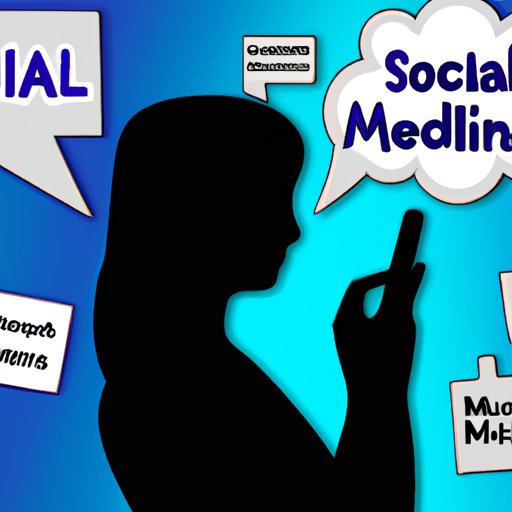Introduction
Social media is defined as any online platform that allows users to create and share content, such as websites, applications, and other online communities. With the rise of social media, it has become increasingly difficult to ignore its impact on our mental health. From comparison with others to cyberbullying and addiction, there are many potential risks associated with social media use.
Body
Comparison with Others and the Potential for Low Self-Esteem
One of the main risks associated with social media use is the tendency to compare ourselves with others. We can quickly become overwhelmed with images of people who seem to have perfect lives, while we may feel like ours is not up to par. This constant comparison can lead to feelings of inadequacy, insecurity, and low self-esteem.
Negative Comments, Trolling, and Cyberbullying
Social media can also be a breeding ground for negative comments, trolling, and cyberbullying. It can be easy to forget that the people behind the computer screens are real people with real feelings. Unfortunately, some people take advantage of this anonymity to spread hurtful words and insults. This can lead to serious mental health issues such as anxiety, depression, and even suicidal thoughts.
Unfiltered and Biased News
We’re all guilty of scrolling through our news feeds in search of something interesting to read or watch. However, it’s important to remember that not everything we see is true. Social media can be a great source of information, but it can also be full of false information, biased opinions, and unverified sources. This can lead to feelings of confusion, stress, and anxiety.
Compulsive Checking of Notifications
It’s no secret that social media can be addictive. Many of us have become accustomed to constantly checking our phones for notifications, likes, and comments. This compulsive behavior can interfere with our daily activities and cause feelings of guilt and shame. It can also increase our levels of stress and anxiety.
Poor Physical Health
Spending too much time on social media can also have a negative effect on our physical health. Prolonged screen time can lead to eye strain, headaches, and neck pain. Additionally, sitting for long periods of time can cause muscle stiffness and fatigue. All of these physical ailments can contribute to mental health issues such as depression and anxiety.
Addiction and Withdrawal Symptoms
Social media addiction is a real issue. People who are addicted to social media often experience withdrawal symptoms when they try to cut down or stop using it completely. These symptoms can include irritability, restlessness, anxiety, and depression. If left untreated, these symptoms can worsen and lead to more serious mental health issues.
Unhealthy Obsession with Perfectionism
Many of us strive for perfection on social media. We post perfectly curated photos and carefully crafted captions in an effort to portray a certain image of ourselves. This obsession with perfectionism can lead to feelings of inadequacy, anxiety, and depression. It can also lead to unrealistic expectations that can be difficult to live up to.
Conclusion
Social media can be a great tool for staying connected with friends and family, but it’s important to be aware of the potential risks associated with it. From comparison with others to cyberbullying and addiction, there are many potential dangers that come with social media use. To protect your mental health, it’s important to manage your social media use. Try setting boundaries such as limiting the amount of time you spend on social media each day and unfollowing accounts that make you feel insecure or anxious. If you find yourself struggling with mental health issues related to social media use, it’s important to seek professional help.
(Note: Is this article not meeting your expectations? Do you have knowledge or insights to share? Unlock new opportunities and expand your reach by joining our authors team. Click Registration to join us and share your expertise with our readers.)
